Case Study Analysis | Nursing Assignment
VerifiedAdded on 2022/08/29
|9
|2138
|30
AI Summary
Contribute Materials
Your contribution can guide someone’s learning journey. Share your
documents today.
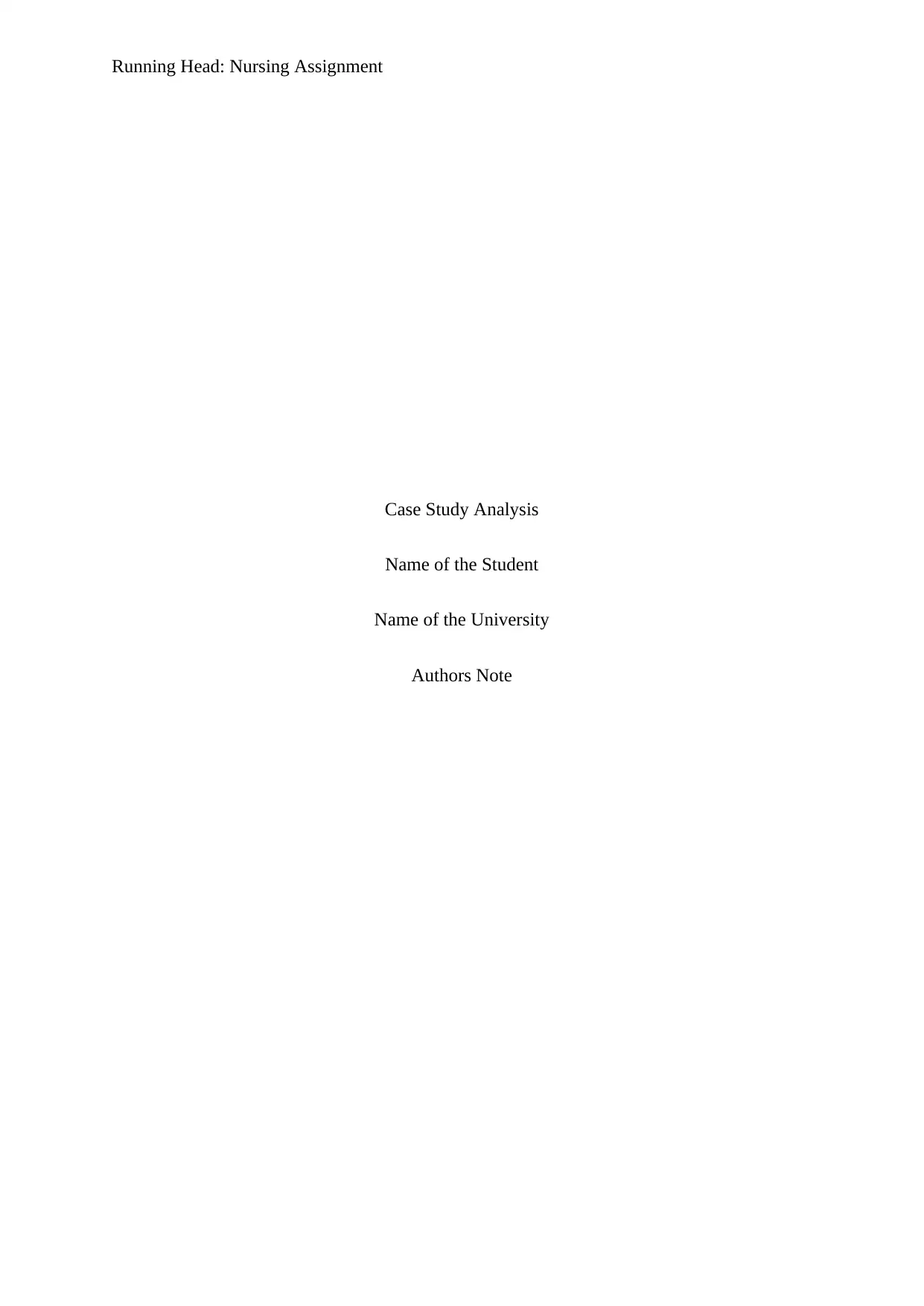
Running Head: Nursing Assignment
Case Study Analysis
Name of the Student
Name of the University
Authors Note
Case Study Analysis
Name of the Student
Name of the University
Authors Note
Secure Best Marks with AI Grader
Need help grading? Try our AI Grader for instant feedback on your assignments.
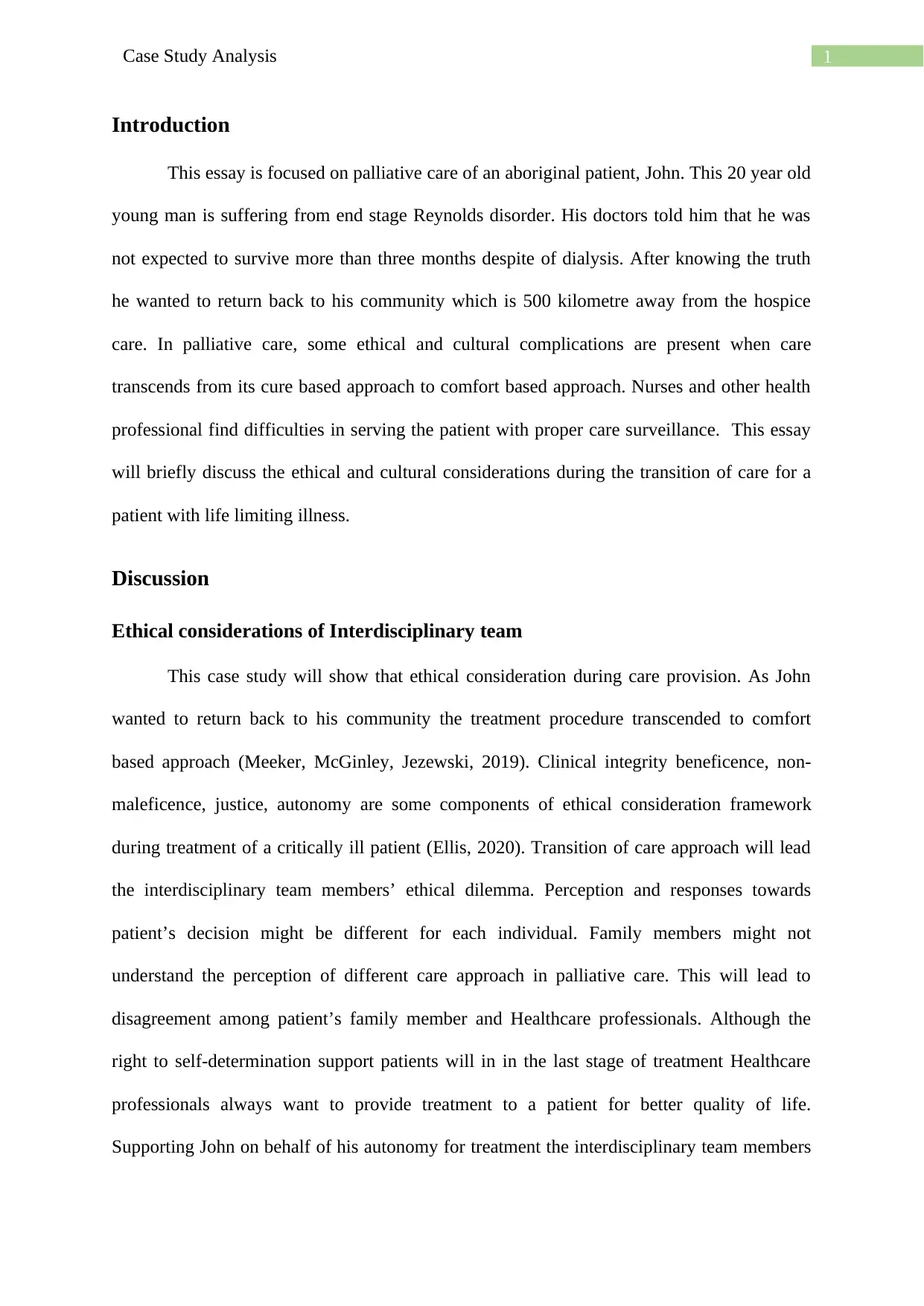
1Case Study Analysis
Introduction
This essay is focused on palliative care of an aboriginal patient, John. This 20 year old
young man is suffering from end stage Reynolds disorder. His doctors told him that he was
not expected to survive more than three months despite of dialysis. After knowing the truth
he wanted to return back to his community which is 500 kilometre away from the hospice
care. In palliative care, some ethical and cultural complications are present when care
transcends from its cure based approach to comfort based approach. Nurses and other health
professional find difficulties in serving the patient with proper care surveillance. This essay
will briefly discuss the ethical and cultural considerations during the transition of care for a
patient with life limiting illness.
Discussion
Ethical considerations of Interdisciplinary team
This case study will show that ethical consideration during care provision. As John
wanted to return back to his community the treatment procedure transcended to comfort
based approach (Meeker, McGinley, Jezewski, 2019). Clinical integrity beneficence, non-
maleficence, justice, autonomy are some components of ethical consideration framework
during treatment of a critically ill patient (Ellis, 2020). Transition of care approach will lead
the interdisciplinary team members’ ethical dilemma. Perception and responses towards
patient’s decision might be different for each individual. Family members might not
understand the perception of different care approach in palliative care. This will lead to
disagreement among patient’s family member and Healthcare professionals. Although the
right to self-determination support patients will in in the last stage of treatment Healthcare
professionals always want to provide treatment to a patient for better quality of life.
Supporting John on behalf of his autonomy for treatment the interdisciplinary team members
Introduction
This essay is focused on palliative care of an aboriginal patient, John. This 20 year old
young man is suffering from end stage Reynolds disorder. His doctors told him that he was
not expected to survive more than three months despite of dialysis. After knowing the truth
he wanted to return back to his community which is 500 kilometre away from the hospice
care. In palliative care, some ethical and cultural complications are present when care
transcends from its cure based approach to comfort based approach. Nurses and other health
professional find difficulties in serving the patient with proper care surveillance. This essay
will briefly discuss the ethical and cultural considerations during the transition of care for a
patient with life limiting illness.
Discussion
Ethical considerations of Interdisciplinary team
This case study will show that ethical consideration during care provision. As John
wanted to return back to his community the treatment procedure transcended to comfort
based approach (Meeker, McGinley, Jezewski, 2019). Clinical integrity beneficence, non-
maleficence, justice, autonomy are some components of ethical consideration framework
during treatment of a critically ill patient (Ellis, 2020). Transition of care approach will lead
the interdisciplinary team members’ ethical dilemma. Perception and responses towards
patient’s decision might be different for each individual. Family members might not
understand the perception of different care approach in palliative care. This will lead to
disagreement among patient’s family member and Healthcare professionals. Although the
right to self-determination support patients will in in the last stage of treatment Healthcare
professionals always want to provide treatment to a patient for better quality of life.
Supporting John on behalf of his autonomy for treatment the interdisciplinary team members
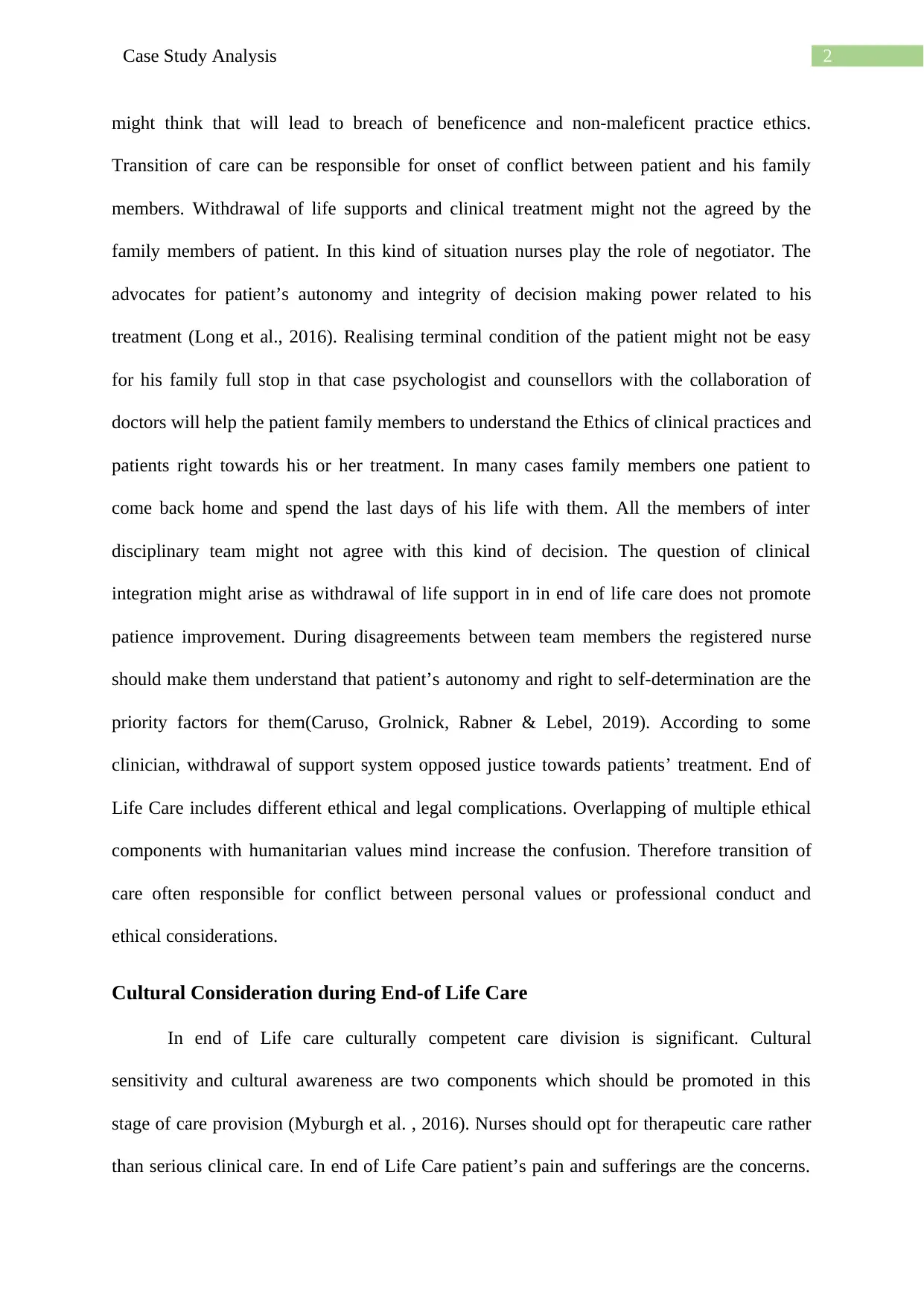
2Case Study Analysis
might think that will lead to breach of beneficence and non-maleficent practice ethics.
Transition of care can be responsible for onset of conflict between patient and his family
members. Withdrawal of life supports and clinical treatment might not the agreed by the
family members of patient. In this kind of situation nurses play the role of negotiator. The
advocates for patient’s autonomy and integrity of decision making power related to his
treatment (Long et al., 2016). Realising terminal condition of the patient might not be easy
for his family full stop in that case psychologist and counsellors with the collaboration of
doctors will help the patient family members to understand the Ethics of clinical practices and
patients right towards his or her treatment. In many cases family members one patient to
come back home and spend the last days of his life with them. All the members of inter
disciplinary team might not agree with this kind of decision. The question of clinical
integration might arise as withdrawal of life support in in end of life care does not promote
patience improvement. During disagreements between team members the registered nurse
should make them understand that patient’s autonomy and right to self-determination are the
priority factors for them(Caruso, Grolnick, Rabner & Lebel, 2019). According to some
clinician, withdrawal of support system opposed justice towards patients’ treatment. End of
Life Care includes different ethical and legal complications. Overlapping of multiple ethical
components with humanitarian values mind increase the confusion. Therefore transition of
care often responsible for conflict between personal values or professional conduct and
ethical considerations.
Cultural Consideration during End-of Life Care
In end of Life care culturally competent care division is significant. Cultural
sensitivity and cultural awareness are two components which should be promoted in this
stage of care provision (Myburgh et al. , 2016). Nurses should opt for therapeutic care rather
than serious clinical care. In end of Life Care patient’s pain and sufferings are the concerns.
might think that will lead to breach of beneficence and non-maleficent practice ethics.
Transition of care can be responsible for onset of conflict between patient and his family
members. Withdrawal of life supports and clinical treatment might not the agreed by the
family members of patient. In this kind of situation nurses play the role of negotiator. The
advocates for patient’s autonomy and integrity of decision making power related to his
treatment (Long et al., 2016). Realising terminal condition of the patient might not be easy
for his family full stop in that case psychologist and counsellors with the collaboration of
doctors will help the patient family members to understand the Ethics of clinical practices and
patients right towards his or her treatment. In many cases family members one patient to
come back home and spend the last days of his life with them. All the members of inter
disciplinary team might not agree with this kind of decision. The question of clinical
integration might arise as withdrawal of life support in in end of life care does not promote
patience improvement. During disagreements between team members the registered nurse
should make them understand that patient’s autonomy and right to self-determination are the
priority factors for them(Caruso, Grolnick, Rabner & Lebel, 2019). According to some
clinician, withdrawal of support system opposed justice towards patients’ treatment. End of
Life Care includes different ethical and legal complications. Overlapping of multiple ethical
components with humanitarian values mind increase the confusion. Therefore transition of
care often responsible for conflict between personal values or professional conduct and
ethical considerations.
Cultural Consideration during End-of Life Care
In end of Life care culturally competent care division is significant. Cultural
sensitivity and cultural awareness are two components which should be promoted in this
stage of care provision (Myburgh et al. , 2016). Nurses should opt for therapeutic care rather
than serious clinical care. In end of Life Care patient’s pain and sufferings are the concerns.
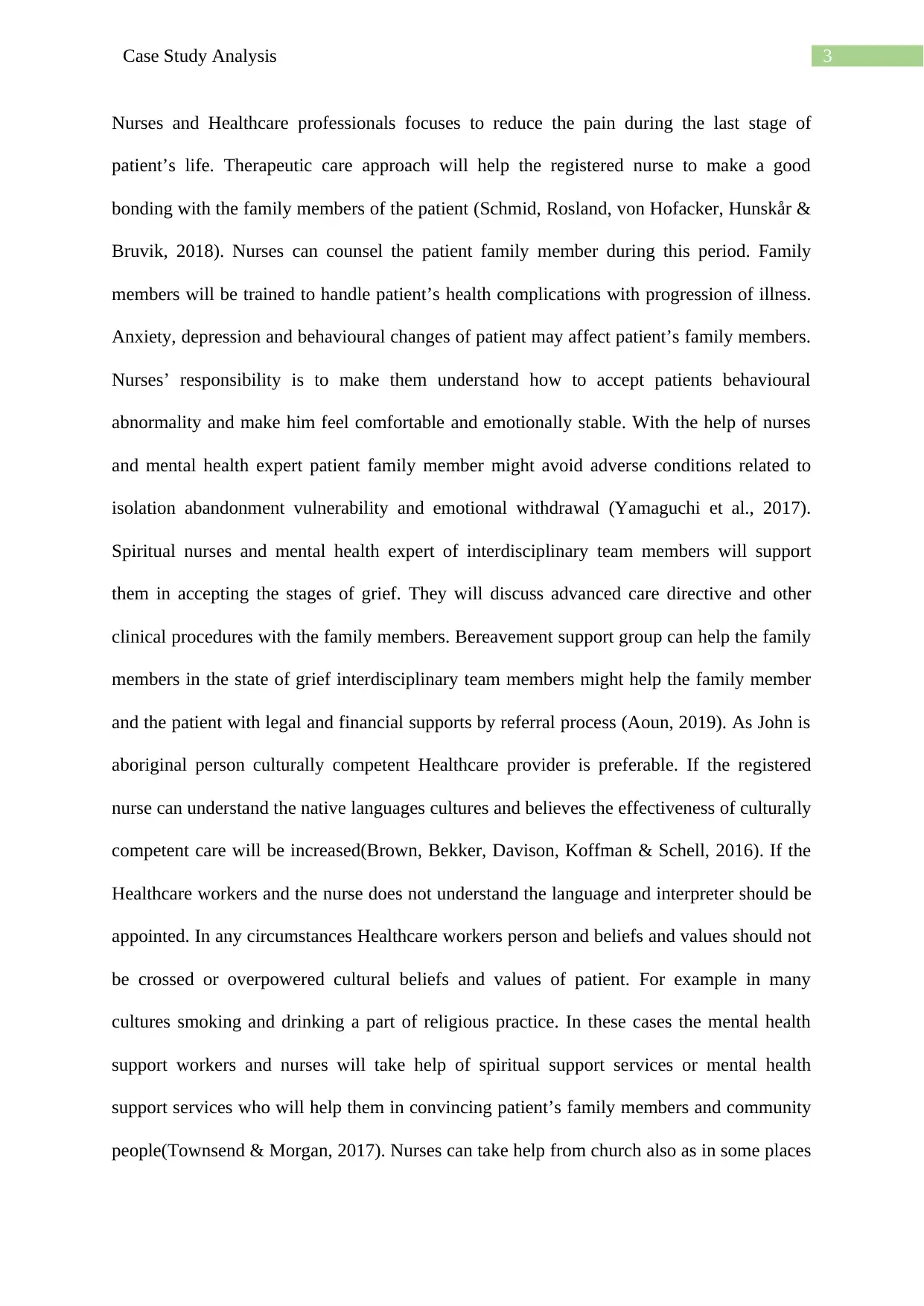
3Case Study Analysis
Nurses and Healthcare professionals focuses to reduce the pain during the last stage of
patient’s life. Therapeutic care approach will help the registered nurse to make a good
bonding with the family members of the patient (Schmid, Rosland, von Hofacker, Hunskår &
Bruvik, 2018). Nurses can counsel the patient family member during this period. Family
members will be trained to handle patient’s health complications with progression of illness.
Anxiety, depression and behavioural changes of patient may affect patient’s family members.
Nurses’ responsibility is to make them understand how to accept patients behavioural
abnormality and make him feel comfortable and emotionally stable. With the help of nurses
and mental health expert patient family member might avoid adverse conditions related to
isolation abandonment vulnerability and emotional withdrawal (Yamaguchi et al., 2017).
Spiritual nurses and mental health expert of interdisciplinary team members will support
them in accepting the stages of grief. They will discuss advanced care directive and other
clinical procedures with the family members. Bereavement support group can help the family
members in the state of grief interdisciplinary team members might help the family member
and the patient with legal and financial supports by referral process (Aoun, 2019). As John is
aboriginal person culturally competent Healthcare provider is preferable. If the registered
nurse can understand the native languages cultures and believes the effectiveness of culturally
competent care will be increased(Brown, Bekker, Davison, Koffman & Schell, 2016). If the
Healthcare workers and the nurse does not understand the language and interpreter should be
appointed. In any circumstances Healthcare workers person and beliefs and values should not
be crossed or overpowered cultural beliefs and values of patient. For example in many
cultures smoking and drinking a part of religious practice. In these cases the mental health
support workers and nurses will take help of spiritual support services or mental health
support services who will help them in convincing patient’s family members and community
people(Townsend & Morgan, 2017). Nurses can take help from church also as in some places
Nurses and Healthcare professionals focuses to reduce the pain during the last stage of
patient’s life. Therapeutic care approach will help the registered nurse to make a good
bonding with the family members of the patient (Schmid, Rosland, von Hofacker, Hunskår &
Bruvik, 2018). Nurses can counsel the patient family member during this period. Family
members will be trained to handle patient’s health complications with progression of illness.
Anxiety, depression and behavioural changes of patient may affect patient’s family members.
Nurses’ responsibility is to make them understand how to accept patients behavioural
abnormality and make him feel comfortable and emotionally stable. With the help of nurses
and mental health expert patient family member might avoid adverse conditions related to
isolation abandonment vulnerability and emotional withdrawal (Yamaguchi et al., 2017).
Spiritual nurses and mental health expert of interdisciplinary team members will support
them in accepting the stages of grief. They will discuss advanced care directive and other
clinical procedures with the family members. Bereavement support group can help the family
members in the state of grief interdisciplinary team members might help the family member
and the patient with legal and financial supports by referral process (Aoun, 2019). As John is
aboriginal person culturally competent Healthcare provider is preferable. If the registered
nurse can understand the native languages cultures and believes the effectiveness of culturally
competent care will be increased(Brown, Bekker, Davison, Koffman & Schell, 2016). If the
Healthcare workers and the nurse does not understand the language and interpreter should be
appointed. In any circumstances Healthcare workers person and beliefs and values should not
be crossed or overpowered cultural beliefs and values of patient. For example in many
cultures smoking and drinking a part of religious practice. In these cases the mental health
support workers and nurses will take help of spiritual support services or mental health
support services who will help them in convincing patient’s family members and community
people(Townsend & Morgan, 2017). Nurses can take help from church also as in some places
Secure Best Marks with AI Grader
Need help grading? Try our AI Grader for instant feedback on your assignments.
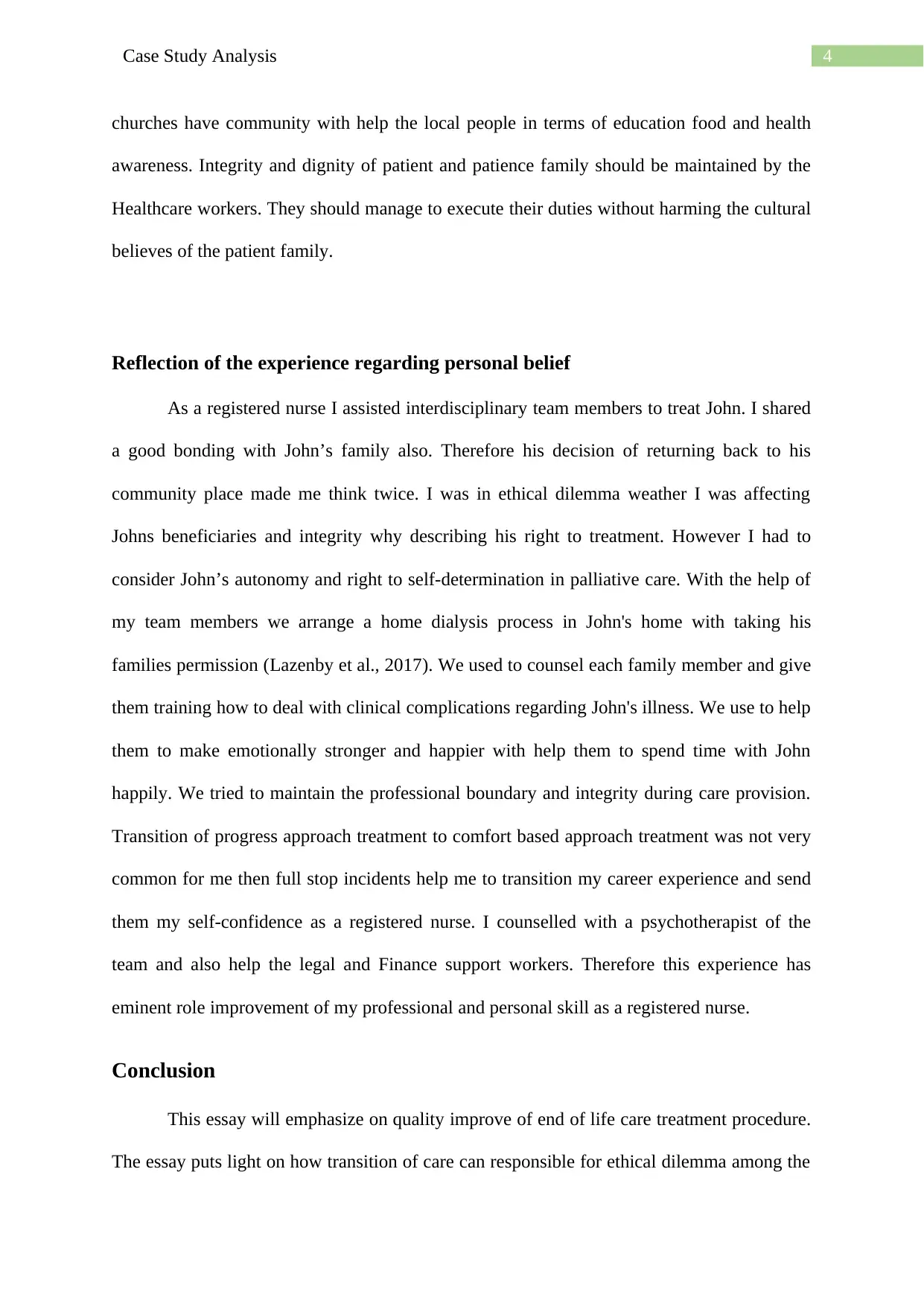
4Case Study Analysis
churches have community with help the local people in terms of education food and health
awareness. Integrity and dignity of patient and patience family should be maintained by the
Healthcare workers. They should manage to execute their duties without harming the cultural
believes of the patient family.
Reflection of the experience regarding personal belief
As a registered nurse I assisted interdisciplinary team members to treat John. I shared
a good bonding with John’s family also. Therefore his decision of returning back to his
community place made me think twice. I was in ethical dilemma weather I was affecting
Johns beneficiaries and integrity why describing his right to treatment. However I had to
consider John’s autonomy and right to self-determination in palliative care. With the help of
my team members we arrange a home dialysis process in John's home with taking his
families permission (Lazenby et al., 2017). We used to counsel each family member and give
them training how to deal with clinical complications regarding John's illness. We use to help
them to make emotionally stronger and happier with help them to spend time with John
happily. We tried to maintain the professional boundary and integrity during care provision.
Transition of progress approach treatment to comfort based approach treatment was not very
common for me then full stop incidents help me to transition my career experience and send
them my self-confidence as a registered nurse. I counselled with a psychotherapist of the
team and also help the legal and Finance support workers. Therefore this experience has
eminent role improvement of my professional and personal skill as a registered nurse.
Conclusion
This essay will emphasize on quality improve of end of life care treatment procedure.
The essay puts light on how transition of care can responsible for ethical dilemma among the
churches have community with help the local people in terms of education food and health
awareness. Integrity and dignity of patient and patience family should be maintained by the
Healthcare workers. They should manage to execute their duties without harming the cultural
believes of the patient family.
Reflection of the experience regarding personal belief
As a registered nurse I assisted interdisciplinary team members to treat John. I shared
a good bonding with John’s family also. Therefore his decision of returning back to his
community place made me think twice. I was in ethical dilemma weather I was affecting
Johns beneficiaries and integrity why describing his right to treatment. However I had to
consider John’s autonomy and right to self-determination in palliative care. With the help of
my team members we arrange a home dialysis process in John's home with taking his
families permission (Lazenby et al., 2017). We used to counsel each family member and give
them training how to deal with clinical complications regarding John's illness. We use to help
them to make emotionally stronger and happier with help them to spend time with John
happily. We tried to maintain the professional boundary and integrity during care provision.
Transition of progress approach treatment to comfort based approach treatment was not very
common for me then full stop incidents help me to transition my career experience and send
them my self-confidence as a registered nurse. I counselled with a psychotherapist of the
team and also help the legal and Finance support workers. Therefore this experience has
eminent role improvement of my professional and personal skill as a registered nurse.
Conclusion
This essay will emphasize on quality improve of end of life care treatment procedure.
The essay puts light on how transition of care can responsible for ethical dilemma among the
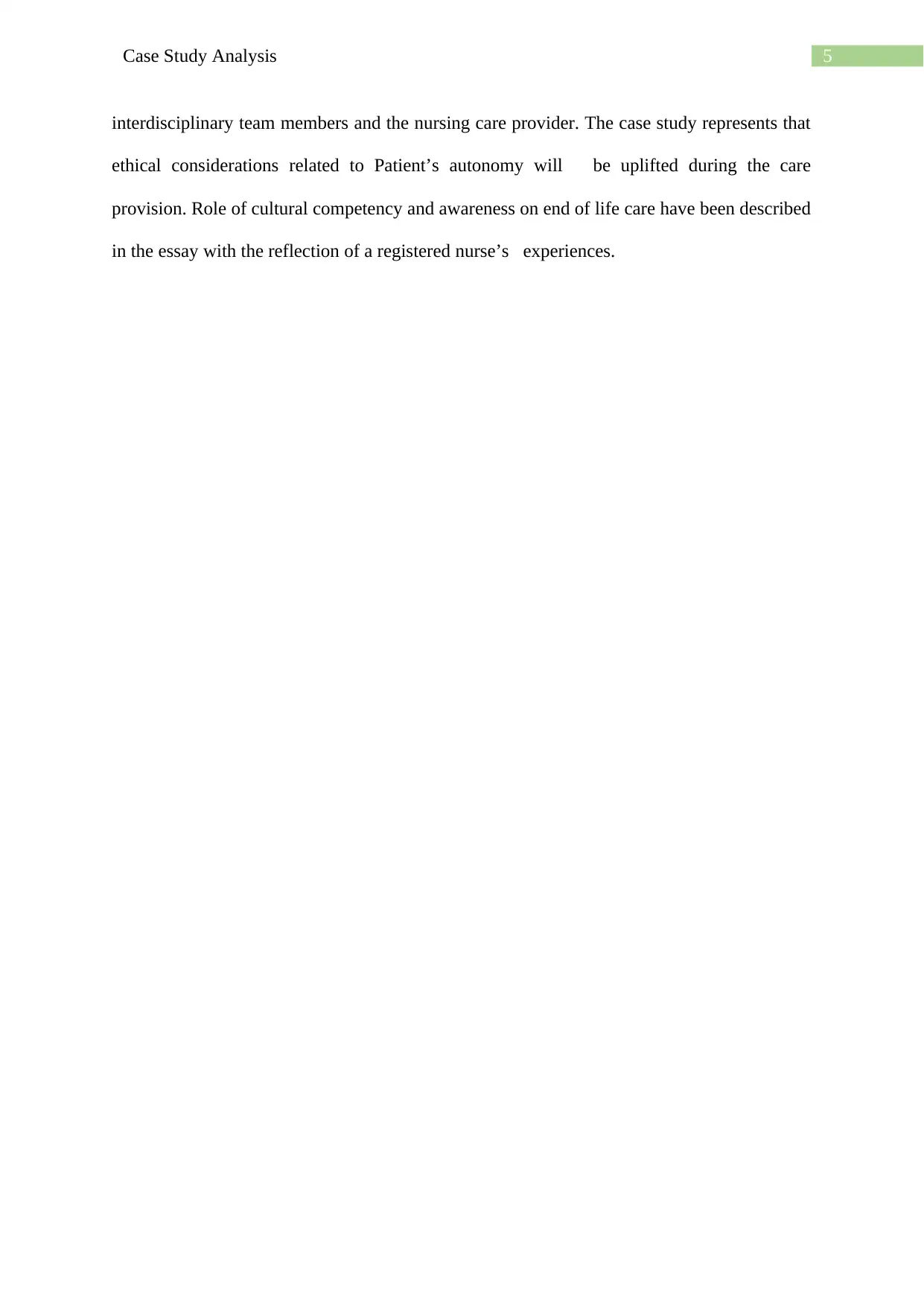
5Case Study Analysis
interdisciplinary team members and the nursing care provider. The case study represents that
ethical considerations related to Patient’s autonomy will be uplifted during the care
provision. Role of cultural competency and awareness on end of life care have been described
in the essay with the reflection of a registered nurse’s experiences.
interdisciplinary team members and the nursing care provider. The case study represents that
ethical considerations related to Patient’s autonomy will be uplifted during the care
provision. Role of cultural competency and awareness on end of life care have been described
in the essay with the reflection of a registered nurse’s experiences.
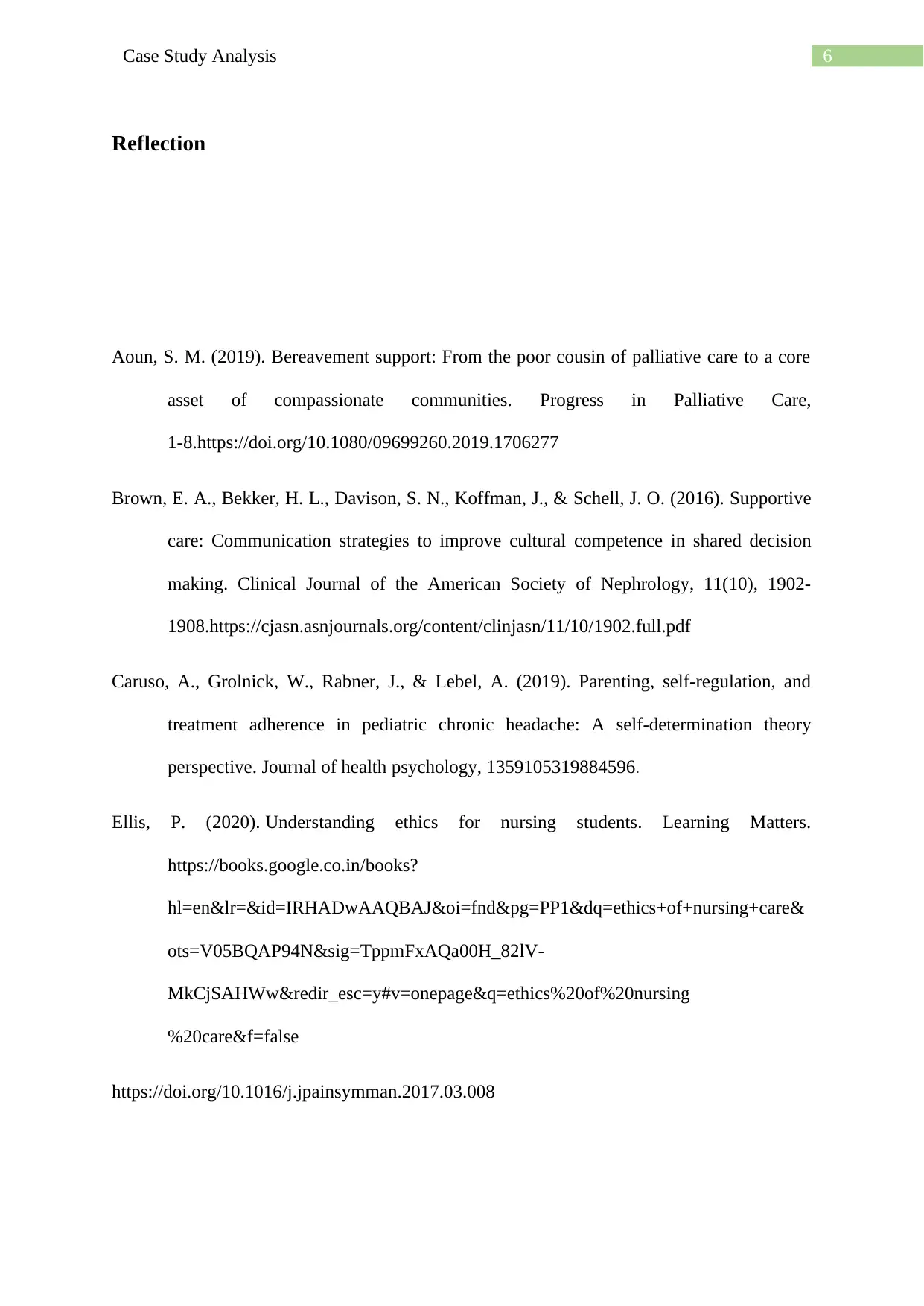
6Case Study Analysis
Reflection
Aoun, S. M. (2019). Bereavement support: From the poor cousin of palliative care to a core
asset of compassionate communities. Progress in Palliative Care,
1-8.https://doi.org/10.1080/09699260.2019.1706277
Brown, E. A., Bekker, H. L., Davison, S. N., Koffman, J., & Schell, J. O. (2016). Supportive
care: Communication strategies to improve cultural competence in shared decision
making. Clinical Journal of the American Society of Nephrology, 11(10), 1902-
1908.https://cjasn.asnjournals.org/content/clinjasn/11/10/1902.full.pdf
Caruso, A., Grolnick, W., Rabner, J., & Lebel, A. (2019). Parenting, self-regulation, and
treatment adherence in pediatric chronic headache: A self-determination theory
perspective. Journal of health psychology, 1359105319884596.
Ellis, P. (2020). Understanding ethics for nursing students. Learning Matters.
https://books.google.co.in/books?
hl=en&lr=&id=IRHADwAAQBAJ&oi=fnd&pg=PP1&dq=ethics+of+nursing+care&
ots=V05BQAP94N&sig=TppmFxAQa00H_82lV-
MkCjSAHWw&redir_esc=y#v=onepage&q=ethics%20of%20nursing
%20care&f=false
https://doi.org/10.1016/j.jpainsymman.2017.03.008
Reflection
Aoun, S. M. (2019). Bereavement support: From the poor cousin of palliative care to a core
asset of compassionate communities. Progress in Palliative Care,
1-8.https://doi.org/10.1080/09699260.2019.1706277
Brown, E. A., Bekker, H. L., Davison, S. N., Koffman, J., & Schell, J. O. (2016). Supportive
care: Communication strategies to improve cultural competence in shared decision
making. Clinical Journal of the American Society of Nephrology, 11(10), 1902-
1908.https://cjasn.asnjournals.org/content/clinjasn/11/10/1902.full.pdf
Caruso, A., Grolnick, W., Rabner, J., & Lebel, A. (2019). Parenting, self-regulation, and
treatment adherence in pediatric chronic headache: A self-determination theory
perspective. Journal of health psychology, 1359105319884596.
Ellis, P. (2020). Understanding ethics for nursing students. Learning Matters.
https://books.google.co.in/books?
hl=en&lr=&id=IRHADwAAQBAJ&oi=fnd&pg=PP1&dq=ethics+of+nursing+care&
ots=V05BQAP94N&sig=TppmFxAQa00H_82lV-
MkCjSAHWw&redir_esc=y#v=onepage&q=ethics%20of%20nursing
%20care&f=false
https://doi.org/10.1016/j.jpainsymman.2017.03.008
Paraphrase This Document
Need a fresh take? Get an instant paraphrase of this document with our AI Paraphraser
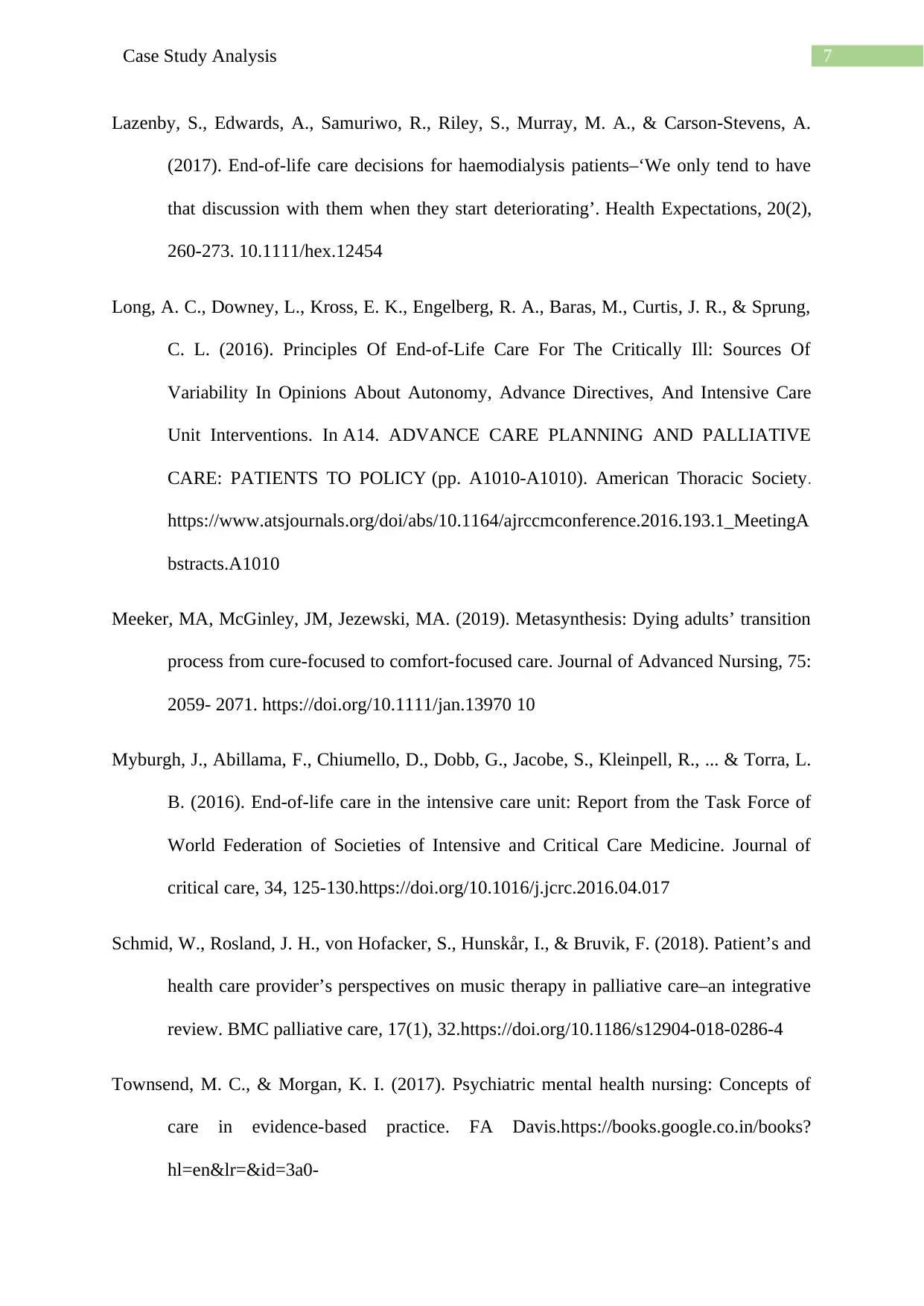
7Case Study Analysis
Lazenby, S., Edwards, A., Samuriwo, R., Riley, S., Murray, M. A., & Carson‐Stevens, A.
(2017). End‐of‐life care decisions for haemodialysis patients–‘We only tend to have
that discussion with them when they start deteriorating’. Health Expectations, 20(2),
260-273. 10.1111/hex.12454
Long, A. C., Downey, L., Kross, E. K., Engelberg, R. A., Baras, M., Curtis, J. R., & Sprung,
C. L. (2016). Principles Of End-of-Life Care For The Critically Ill: Sources Of
Variability In Opinions About Autonomy, Advance Directives, And Intensive Care
Unit Interventions. In A14. ADVANCE CARE PLANNING AND PALLIATIVE
CARE: PATIENTS TO POLICY (pp. A1010-A1010). American Thoracic Society.
https://www.atsjournals.org/doi/abs/10.1164/ajrccmconference.2016.193.1_MeetingA
bstracts.A1010
Meeker, MA, McGinley, JM, Jezewski, MA. (2019). Metasynthesis: Dying adults’ transition
process from cure‐focused to comfort‐focused care. Journal of Advanced Nursing, 75:
2059- 2071. https://doi.org/10.1111/jan.13970 10
Myburgh, J., Abillama, F., Chiumello, D., Dobb, G., Jacobe, S., Kleinpell, R., ... & Torra, L.
B. (2016). End-of-life care in the intensive care unit: Report from the Task Force of
World Federation of Societies of Intensive and Critical Care Medicine. Journal of
critical care, 34, 125-130.https://doi.org/10.1016/j.jcrc.2016.04.017
Schmid, W., Rosland, J. H., von Hofacker, S., Hunskår, I., & Bruvik, F. (2018). Patient’s and
health care provider’s perspectives on music therapy in palliative care–an integrative
review. BMC palliative care, 17(1), 32.https://doi.org/10.1186/s12904-018-0286-4
Townsend, M. C., & Morgan, K. I. (2017). Psychiatric mental health nursing: Concepts of
care in evidence-based practice. FA Davis.https://books.google.co.in/books?
hl=en&lr=&id=3a0-
Lazenby, S., Edwards, A., Samuriwo, R., Riley, S., Murray, M. A., & Carson‐Stevens, A.
(2017). End‐of‐life care decisions for haemodialysis patients–‘We only tend to have
that discussion with them when they start deteriorating’. Health Expectations, 20(2),
260-273. 10.1111/hex.12454
Long, A. C., Downey, L., Kross, E. K., Engelberg, R. A., Baras, M., Curtis, J. R., & Sprung,
C. L. (2016). Principles Of End-of-Life Care For The Critically Ill: Sources Of
Variability In Opinions About Autonomy, Advance Directives, And Intensive Care
Unit Interventions. In A14. ADVANCE CARE PLANNING AND PALLIATIVE
CARE: PATIENTS TO POLICY (pp. A1010-A1010). American Thoracic Society.
https://www.atsjournals.org/doi/abs/10.1164/ajrccmconference.2016.193.1_MeetingA
bstracts.A1010
Meeker, MA, McGinley, JM, Jezewski, MA. (2019). Metasynthesis: Dying adults’ transition
process from cure‐focused to comfort‐focused care. Journal of Advanced Nursing, 75:
2059- 2071. https://doi.org/10.1111/jan.13970 10
Myburgh, J., Abillama, F., Chiumello, D., Dobb, G., Jacobe, S., Kleinpell, R., ... & Torra, L.
B. (2016). End-of-life care in the intensive care unit: Report from the Task Force of
World Federation of Societies of Intensive and Critical Care Medicine. Journal of
critical care, 34, 125-130.https://doi.org/10.1016/j.jcrc.2016.04.017
Schmid, W., Rosland, J. H., von Hofacker, S., Hunskår, I., & Bruvik, F. (2018). Patient’s and
health care provider’s perspectives on music therapy in palliative care–an integrative
review. BMC palliative care, 17(1), 32.https://doi.org/10.1186/s12904-018-0286-4
Townsend, M. C., & Morgan, K. I. (2017). Psychiatric mental health nursing: Concepts of
care in evidence-based practice. FA Davis.https://books.google.co.in/books?
hl=en&lr=&id=3a0-
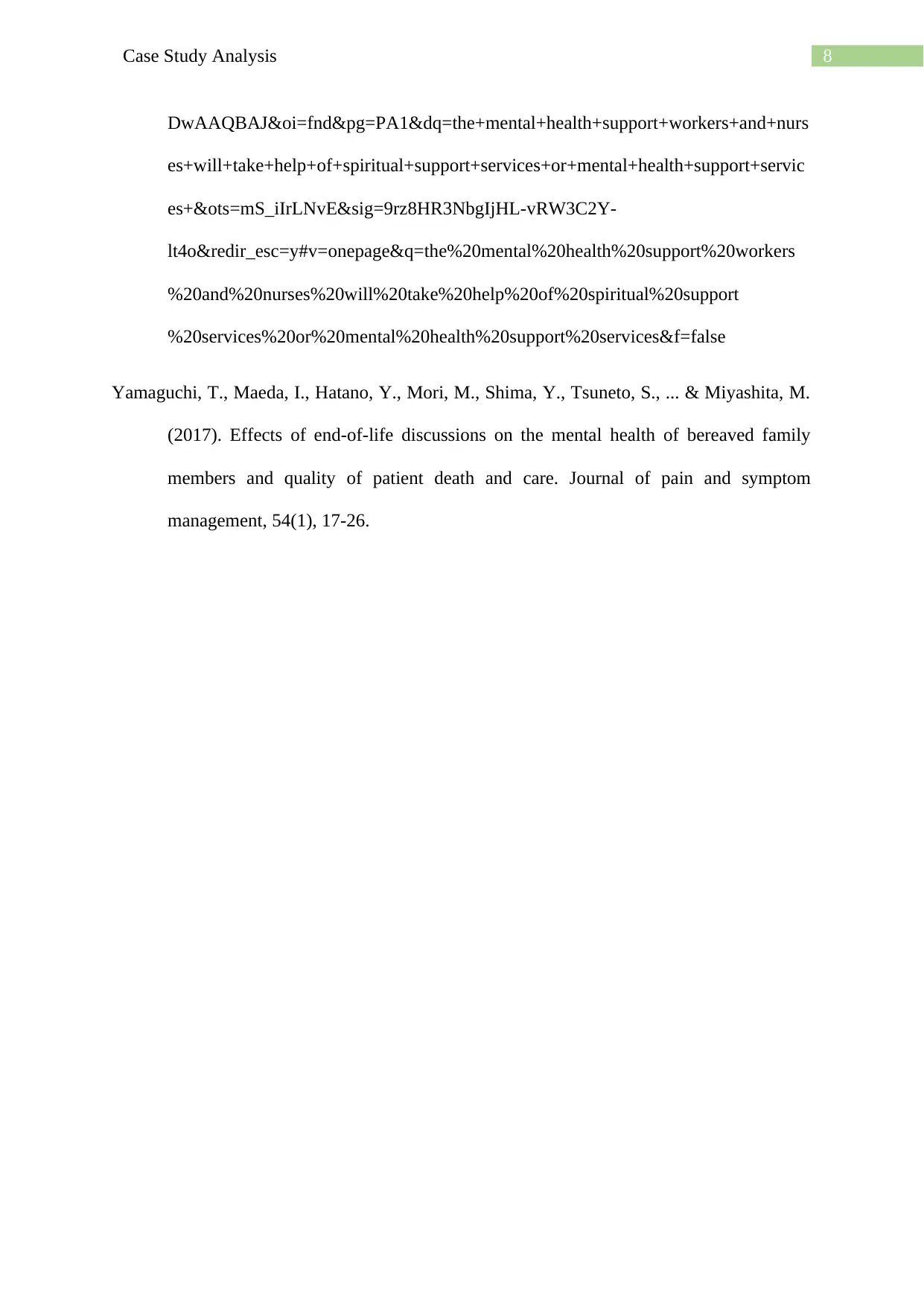
8Case Study Analysis
DwAAQBAJ&oi=fnd&pg=PA1&dq=the+mental+health+support+workers+and+nurs
es+will+take+help+of+spiritual+support+services+or+mental+health+support+servic
es+&ots=mS_iIrLNvE&sig=9rz8HR3NbgIjHL-vRW3C2Y-
lt4o&redir_esc=y#v=onepage&q=the%20mental%20health%20support%20workers
%20and%20nurses%20will%20take%20help%20of%20spiritual%20support
%20services%20or%20mental%20health%20support%20services&f=false
Yamaguchi, T., Maeda, I., Hatano, Y., Mori, M., Shima, Y., Tsuneto, S., ... & Miyashita, M.
(2017). Effects of end-of-life discussions on the mental health of bereaved family
members and quality of patient death and care. Journal of pain and symptom
management, 54(1), 17-26.
DwAAQBAJ&oi=fnd&pg=PA1&dq=the+mental+health+support+workers+and+nurs
es+will+take+help+of+spiritual+support+services+or+mental+health+support+servic
es+&ots=mS_iIrLNvE&sig=9rz8HR3NbgIjHL-vRW3C2Y-
lt4o&redir_esc=y#v=onepage&q=the%20mental%20health%20support%20workers
%20and%20nurses%20will%20take%20help%20of%20spiritual%20support
%20services%20or%20mental%20health%20support%20services&f=false
Yamaguchi, T., Maeda, I., Hatano, Y., Mori, M., Shima, Y., Tsuneto, S., ... & Miyashita, M.
(2017). Effects of end-of-life discussions on the mental health of bereaved family
members and quality of patient death and care. Journal of pain and symptom
management, 54(1), 17-26.
1 out of 9
Related Documents
Your All-in-One AI-Powered Toolkit for Academic Success.
+13062052269
info@desklib.com
Available 24*7 on WhatsApp / Email
![[object Object]](/_next/static/media/star-bottom.7253800d.svg)
Unlock your academic potential
© 2024 | Zucol Services PVT LTD | All rights reserved.





